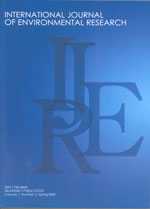
|
International Journal of Environmental Research
University of Tehran
ISSN: 1735-6865
EISSN: 1735-6865
Vol. 3, No. 1, 2009, pp. 109-116
|
 Bioline Code: er09012
Bioline Code: er09012
Full paper language: English
Document type: Research Article
Document available free of charge
|
|
|
International Journal of Environmental Research, Vol. 3, No. 1, 2009, pp. 109-116
| en |
Development of the Group Malmquist Productivity Index on non-discretionary Factors
Abbaspour, M.; Lotfi, F. Hosseinzadeh; Karbassi, A.R.; Roayaei, E. & Nikoomaram, H.
Abstract
Data envelopment analysis (DEA) measures the relative efficiency of a homogenous set of decision-making units (DMUs) when multiple inputs and outputs are present. The DEA-based Malmquist productivity index measuring the productivity change of DMUs over time has proven itself to be a valid tool to compare group performance. However, in the previous models developed for this purpose, it was supposed that all factors were controllable or discretionary. It is noteworthy that in most real cases, there are some inputs and outputs that are non-discretionary or semi-discretionary. Therefore, the main objective of the present study was to develop the DEA-based Malmquist productivity index on such factors to compare group performance at the same period of time. The applicability of the proposed model has been illustrated by the comparison of environmental performance – concerning HSE-MS principles – between the two groups of Iranian and International oil and gas general contractors. Involving the controllability level of factors in comparing group performance, the model offers an scalar that can easily be interpreted to compare the performance of the two groups and to determine the superior performance.
Keywords
Environment, Performance, Health, Safety, Management, Non-discretionary
|
| |
© Copyright 2009 - Graduate Faculty of Environment University of Tehran
Alternative site location: http://ijer.ut.ac.ir/
|
|
